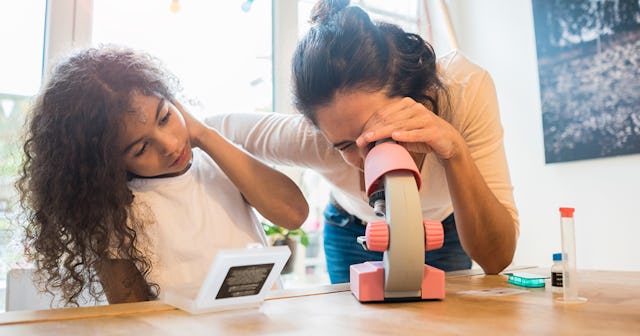Stop Stigmatizing Homeschooled Kids

My homeschooled kids are a lot of things. They’re smart: they can recite “Ariel’s Song” from The Tempest; explain obscure facts about creatures from the Ordovician Period; identify salamander genuses. But they’re behind in some areas, too: my 7-year-old is slower to read; my 5-year-old knows all his letter sounds, but not necessarily their names. My kids are funny: my 9-year-old recently told me he was employing occlumency to repel “This Song Is Gonna Get Stuck Inside Your Head” from The Lego Movie 2. My kids are cute (at least I think so); my kids are sometimes well-behaved and sometimes jump off the couches. Honestly? My kids are a lot like your kids. One thing my kids aren’t? Weird.
Well maybe they are weird, but not ‘weird’ in the way most people use to negatively label homeschooled kids.
Just because my children are homeschooled doesn’t automatically make them unsocialized, narrowly-focused freaks. In fact, most homeschoolers, unschoolers, and alternative schoolers are better socialized than kids who spend their days in school. My children play in mixed-age groups. When they go to the playground, everyone is included: girls and boys, ages 10 on down to 3. No one calls anyone a baby. Because they’ve never seen bullying in action, they tend not to bully (though obviously, this isn’t a hard and fast rule, as kids can be assholes across the board). They’ll play with anyone, and it’s not because they have a dearth of friends of something. It’s because they genuinely like other kids, and without assigned grade levels, there’s no social stigma attached to playing with younger kids. My 7-year-old loved to play with a 4-year-old girl for a while. Totally normal.
sallywatts/Getty
My kids are also right on grade level, for the most part. My homeschooled kids are really, really good at some things (like memorizing poetry, including some e.e. cummings), and not-so-good at others (i.e. math). Your kid probably is too. The difference between the two is that we let our kids dive deep into their interests, and figure that the times tables will come when they’re ready. Your kids are on a schedule dictated by someone else, so they need to learn at a pace someone else has set for them. There are definite pros and cons to that. It’s just a different approach to learning. When they were little, we didn’t ‘potty train’ and let our kids decide when they were ready to tackle that challenge. We just take the same approach to division.
My homeschooled kids also are not exceptionally well-behaved. A shocking number of people assume this. They tell me, “I could never spend all day with my kids like that, they’d drive me bananas.” The truth is my kids drive me just as bonkers as yours do. They jump off the couches. They yell. They run around the house in circles and make messes. They tune me out. Normal kid stuff. But instead of recess, I kick them out in the backyard to make a lake or dig holes, perennially favorite activities. Or they plant trees or collect bugs or read. Or whatever. As long as they don’t bother me for a while, because I’m not out there supervising them. They aren’t weird Stepford kids. If anything, they’re muddier and more unkempt than most.
They also don’t veer in the other direction. Some homeschoolers and alternative schoolers are total “hippies” and that’s cool too, but a lot of them are not. I may be thinking of ways to sue the state over climate change, but we vaccinate. I don’t make kombucha; we are self-sustaining, we go to the grocery store. Most of my mom friends are the same way. If you met us on the street, you wouldn’t point to us and say, “That lady probably homeschools.”
Hero Images/Getty
Moreover, like most homeschoolers, we aren’t in it for religious reasons. According to Time4Learning, only 21% of homeschoolers do so for religious or moral reasons; 25% homeschool for “a safer school environment.” Other reasons include: a dissatisfaction with academic instruction (19%), to use a more non-traditional approach to learning (5%), and to meet the additional needs of a child with special needs (5%). We fit several of these categories. But we’re not in it for religion. Neither are most of the homeschoolers I know, though obviously that would vary by area.
Some homeschooled or alternatively-schooled kids avoid a lot of pop culture. My kids do. They aren’t allowed to have cell phones, and when they do, they’ll have flip-phones until they leave for college. No YouTube unless it’s academic and vetted. Most popular TV shows are banned; so is gaming. But this has nothing to do with homeschooling and everything to do with parenting decisions.
I know this sounds strange. But avoiding these things doesn’t change or affect the way my children learn. It’s not part of the culture that surrounds their learning. It’s a personal decision we’ve made based on our own experiences and beliefs. It also hasn’t created social challenges for my kids. No one seems to care that they don’t play Minecraft or Fortnite; no one minds that they don’t watch this TV show or that one.
As homeschooling, unschooling, and alternative schooling becomes increasingly more popular, people need to realize that we’re not all crunchy hippies, recluse geniuses, or cult members in prairie skirts. We are a diverse group. Right now, two of my kids are playing with squirt guns. Another is listening to a podcast on cryptozoology. They watched a movie earlier today, a popular one that your kids have seen recently too.
We’re not freaks. And the more of us there are, the more normal we become. We’re your neighbors, your kids’ friends. Stop stereotyping us. Stop thinking we’re abnormal or strange.
And stop with the assumptions. It gets old.
This article was originally published on